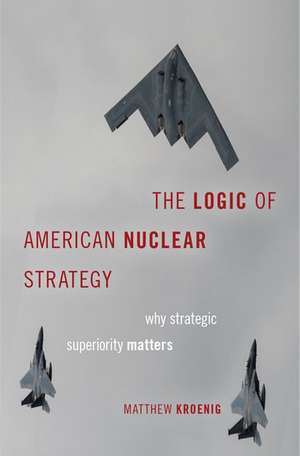The Logic of American Nuclear Strategy: Why Strategic Superiority Matters: Bridging the Gap
Autor Matthew Kroenigen Limba Engleză Hardback – 22 mar 2018
| Toate formatele și edițiile | Preț | Express |
|---|---|---|
| Paperback (1) | 213.53 lei 22-36 zile | |
| Oxford University Press – 17 iul 2020 | 213.53 lei 22-36 zile | |
| Hardback (1) | 252.15 lei 10-16 zile | |
| Oxford University Press – 22 mar 2018 | 252.15 lei 10-16 zile |
Preț: 252.15 lei
Preț vechi: 294.68 lei
-14% Nou
Puncte Express: 378
Preț estimativ în valută:
48.25€ • 50.51$ • 39.92£
48.25€ • 50.51$ • 39.92£
Carte disponibilă
Livrare economică 05-11 martie
Preluare comenzi: 021 569.72.76
Specificații
ISBN-13: 9780190849184
ISBN-10: 0190849185
Pagini: 280
Ilustrații: 4 illustrations
Dimensiuni: 236 x 157 x 28 mm
Greutate: 0.52 kg
Editura: Oxford University Press
Colecția OUP USA
Seria Bridging the Gap
Locul publicării:New York, United States
ISBN-10: 0190849185
Pagini: 280
Ilustrații: 4 illustrations
Dimensiuni: 236 x 157 x 28 mm
Greutate: 0.52 kg
Editura: Oxford University Press
Colecția OUP USA
Seria Bridging the Gap
Locul publicării:New York, United States
Recenzii
Because there is now more available data, the time is right to reexamine some long-held assumptions about whether a significant advantage in nuclear weapons is, in fact, an advantage. Matthew Kroenig offers new theoretical and methodological perspectives in his attempt to do just that. Theoretically, he proposes a synthesis of two theories to argue that nuclear superiority allows for a state to be more aggressive in international crises. Methodologically, he seeks to demonstrate the effect a single independent variable has on multiple dependent variables. Either one of these advances would represent a significant contribution to the literature of nuclear statecraft and compellence. Kroenig combines both in a thorough and compelling work.
The Logic of American Nuclear Strategy offers the most sophisticated case for strategic superiority that I have ever seen.
The Logic of American Nuclear Strategy is a major contribution to the national debate about the role of nuclear weapons in U.S. national security policy. Matthew Kroenig provides penetrating insights into how nuclear posture affects a variety of national security interests and the book is a must read for anyone who wishes to understand this increasingly vital set of issues.
A provocative contribution from a next-gen scholar to the revival of debate about nuclear strategy.
Matthew Kroenig's comprehensive research, analysis, and conclusions provide a compilation of insights and information that policy makers and military leaders must understand. This book should be required reading for policy makers, strategists, and military leaders, as well as students of military strategy and international affairs.
Matthew Kroenig has provided an innovative and counter-intuitive study of why nuclear superiority might matter and why practitioners of both political parties have gravitated consistently towards it even as academic theorists have argued that it doesnt matter. This is an agenda setting book that will be debated by scholars and policy-makers for years to come.
Contrary to much that has been written on the subject, in this provocative new study Matthew Kroenig argues that the United States can attain, and should seek, meaningful military superiority over other nuclear-armed states. This is an important statement of a controversial position that deserves to be read and debated by both policy makers and political scientists.
[Matthew Kroenig] nuanced analysis is original and draws on a wide range of literature on nuclear strategy, crisis bargaining, weapons proliferation, arms races, deterrence and compellence. He offers a novel superiority-brinkmanship synthesis theory to explain the logic of Americas nuclear strategy, informed by academic research, practical concerns, and behaviors of policy makers.
The Logic of American Nuclear Strategy offers the most sophisticated case for strategic superiority that I have ever seen.
The Logic of American Nuclear Strategy is a major contribution to the national debate about the role of nuclear weapons in U.S. national security policy. Matthew Kroenig provides penetrating insights into how nuclear posture affects a variety of national security interests and the book is a must read for anyone who wishes to understand this increasingly vital set of issues.
A provocative contribution from a next-gen scholar to the revival of debate about nuclear strategy.
Matthew Kroenig's comprehensive research, analysis, and conclusions provide a compilation of insights and information that policy makers and military leaders must understand. This book should be required reading for policy makers, strategists, and military leaders, as well as students of military strategy and international affairs.
Matthew Kroenig has provided an innovative and counter-intuitive study of why nuclear superiority might matter and why practitioners of both political parties have gravitated consistently towards it even as academic theorists have argued that it doesnt matter. This is an agenda setting book that will be debated by scholars and policy-makers for years to come.
Contrary to much that has been written on the subject, in this provocative new study Matthew Kroenig argues that the United States can attain, and should seek, meaningful military superiority over other nuclear-armed states. This is an important statement of a controversial position that deserves to be read and debated by both policy makers and political scientists.
[Matthew Kroenig] nuanced analysis is original and draws on a wide range of literature on nuclear strategy, crisis bargaining, weapons proliferation, arms races, deterrence and compellence. He offers a novel superiority-brinkmanship synthesis theory to explain the logic of Americas nuclear strategy, informed by academic research, practical concerns, and behaviors of policy makers.
Notă biografică
Matthew Kroenig is an Associate Professor in the Department of Government and the Edmund A. Walsh School of Foreign Service at Georgetown University and a Senior Fellow in the Brent Scowcroft Center on International Security at The Atlantic Council. He is the author or editor of six books, including Exporting the Bomb: Technology Transfer and the Spread of Nuclear Weapons.












